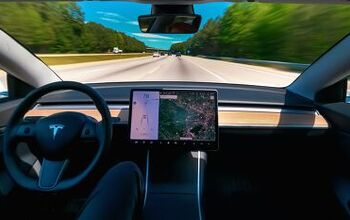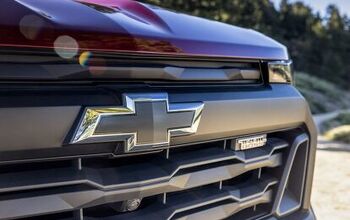U.S. Car Sales Are Down, Average Transaction Prices Are Up

Yesterday, we covered how the economic ramifications of the pandemic has negatively impacted the sales volume of electric vehicles (the ones that aren’t status symbols, anyway) in the United Kingdom. We’ll take a broader view of things today, focusing entirely on the general sales trends taking hold in the United States ahead of the Labor Day weekend.
Under normal circumstances, this would be a period where dealerships tempt the public with juicy discounts to clear out their lots for the subsequent model year. But the pandemic has left factories idle for months and vehicles in short supply. While that wasn’t an issue when everyone was first locked indoors, many states allowed their citizens to reclaim their autonomy as dealers sought new ways of selling without the face-to-face rigamarole of interacting with customers directly. We’re now in a situation where demand remains suppressed but has increased to a level where it outpaces the supply of many popular models — increasing the average transaction price of vehicles.
It’s not a great time to be shopping for a car.
While the months between March and July represented a particularly large gap against 2019 sales, August’s volume is estimated to be nearly 20 percent lower that the previous year’s figures. But with people gradually coming back to a market that’s been idle for months, automakers claim they can’t build some models fast enough to meet demand after exhausting their vehicle reserves.
According to J.D. Power, the average transaction price for a new vehicle rose to $35,420 (a relatively conservative figure) last month. While that’s hardly what someone wants to see in a recession, the situation is said to be the direct result of the laws of supply and demand. The people who are actually buying cars tend to purchase slightly nicer ones and dealerships don’t have many on hand. In recent piece analyzing the market, The Wall Street Journal also noted that the continued trend of lengthening loans has allowing consumers to purchase expensive vehicles with comparatively low monthly payments.
From WSJ:
The auto industry is following a trajectory similar to the housing market, where low interest rates and a shortage of available homes have propelled prices higher.
The automobile market is just one of many parts of the economy in which the divide between haves and have-nots appears to be starker than ever.
With the pool of potential buyers limited by the economic fallout from the ongoing health crisis, U.S. car sales have declined, down 19.8 [percent] in August, according to Motor Intelligence, and car executives say they expect sales to remain depressed for the remainder of the year.
Younger car buyers are getting priced out of the new-vehicle market as auto makers have turned away from cheaper small cars and sedans to focus on bigger, higher-margin vehicles.
Something tells me that further disenfranchising youngsters isn’t a wonderful long-term strategy for the United States, lenders, or the automotive industry in general. The mere fact that demand is down while prices have climbed upward seems to be an overt warning that something is amiss here. But there’s always a chance this crisis will be short-lived. The response to the virus (be it prudent or foolishly reactionary) really mucked up the economy, and the automotive sector has suffered just like everyone else.
Most analysis seem convinced that this will be a temporary issue, however. People are coming back to purchase vehicles and they’re buying the models with higher-than-average margins — which is good news for manufacturers. Yet none of them have ignored the plight of younger adults and those who happen to occupy to lower rungs of the socioeconomic ladder.
“We’ve just been amazed at how resilient the market has been,” Michelle Krebs, an analyst for Cox Automotive, told WSJ. “The people who have money have plenty of it, and they are spending it on expensive vehicles. The low end — that’s where the job losses are.”
But while lower interest rates are supposed to help regular people get into a new vehicle, with the Fed backing the notion to keep them exceptionally low even if inflation starts becoming an issue, this often results in customers paying more money over time. Ultimately, this diminishes their buying power elsewhere — potentially compounding the overall problem. We can certainly fault the industry for pushing high-margin utility vehicles and crossovers and allowing ludicrous loan terms. But it’s not their fault that so many consumers are snubbing their most affordable products for something a little bigger or nicer.
Sadly, years of prioritizing upmarket vehicles has resulted in fewer super-bargains on the used lots. Back when compact cars were all the rage, you could find secondhand dealerships with plenty of budget-focused models in good condition. That’s becoming less true, however. Axios recently published its own estimates on vehicle pricing — claiming that the average transaction for a new automobile in August hit $38,414 (up $400 from January 2020) with used vehicles topping $20,445 (an increase of $900).
Assuming manufacturers see the writing on the wall, we envision economy cars making a gradual return to prominence with larger vehicles holding sway with a large portion of consumers. Otherwise, we’ll be left with a large hunk of the population unable to afford basic transportation as we become a third-world nation.
“The folks that are struggling right now, it’s going to be a real challenge when they need a new car,” said Vince Sheehy, president of Sheehy Auto Stores, which has dealerships around Washington D.C. “And those are customers we’re going to lose.”
[Image: Jeff Bukowski/Shutterstock

A staunch consumer advocate tracking industry trends and regulation. Before joining TTAC, Matt spent a decade working for marketing and research firms based in NYC. Clients included several of the world’s largest automakers, global tire brands, and aftermarket part suppliers. Dissatisfied with the corporate world and resentful of having to wear suits everyday, he pivoted to writing about cars. Since then, that man has become an ardent supporter of the right-to-repair movement, been interviewed on the auto industry by national radio broadcasts, driven more rental cars than anyone ever should, participated in amateur rallying events, and received the requisite minimum training as sanctioned by the SCCA. Handy with a wrench, Matt grew up surrounded by Detroit auto workers and managed to get a pizza delivery job before he was legally eligible. He later found himself driving box trucks through Manhattan, guaranteeing future sympathy for actual truckers. He continues to conduct research pertaining to the automotive sector as an independent contractor and has since moved back to his native Michigan, closer to where the cars are born. A contrarian, Matt claims to prefer understeer — stating that front and all-wheel drive vehicles cater best to his driving style.
More by Matt Posky
Latest Car Reviews
Read moreLatest Product Reviews
Read moreRecent Comments
- ChristianWimmer It might be overpriced for most, but probably not for the affluent city-dwellers who these are targeted at - we have tons of them in Munich where I live so I “get it”. I just think these look so terribly cheap and weird from a design POV.
- NotMyCircusNotMyMonkeys so many people here fellating musks fat sack, or hodling the baggies for TSLA. which are you?
- Kwik_Shift_Pro4X Canadians are able to win?
- Doc423 More over-priced, unreliable garbage from Mini Cooper/BMW.
- Tsarcasm Chevron Techron and Lubri-Moly Jectron are the only ones that have a lot of Polyether Amine (PEA) in them.


































Comments
Join the conversation
Need to make all this high tech safety stuff optional and by order only. This stuff is driving up costs and weight. Prices of new cars are crazy high, way too high!
"Younger car buyers are getting priced out of the new-vehicle market as auto makers have turned away from cheaper small cars and sedans to focus on bigger, higher-margin vehicles"............... It does not appear that automakers have turned away from cheaper smaller cars, the buyer has. If the Fit sold even one quarter as well as the F150, would Honda have stopped selling it here?